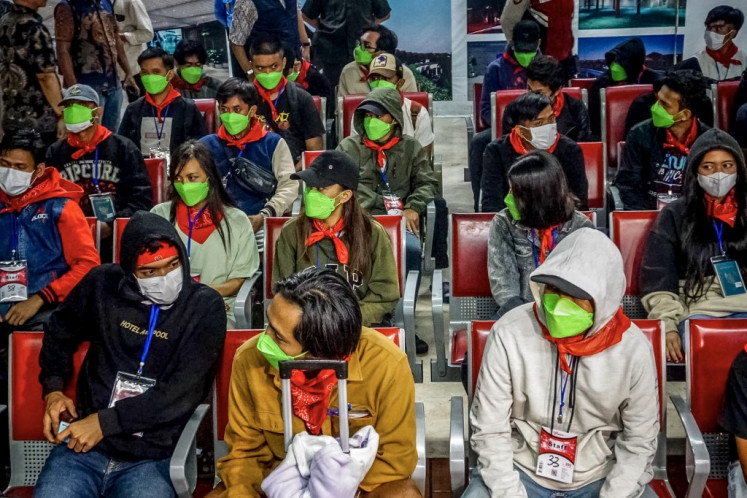Popular Reads
Top Results
Can't find what you're looking for?
View all search resultsPopular Reads
Top Results
Can't find what you're looking for?
View all search resultsThe week in review: Bewildering U-turns
JP/DONThere seems to be no end to the troubled Golkar Partyâs messy internal conflict, as tensions between its two opposing factions escalate
Change text size
Gift Premium Articles
to Anyone
JP/DON
There seems to be no end to the troubled Golkar Party's messy internal conflict, as tensions between its two opposing factions escalate.
Political observers have warned that the party's inability to settle its leadership dispute could lose it the chance to participate in regional elections scheduled for December this year.
The conflict has been made worse by the verdict of the Jakarta State Administrative Court (PTUN), which suspended on Wednesday a decree issued by Law and Human Rights Minister Yasonna H. Laoly recognizing the chairmanship of Agung Laksono.
The decree also approved Golkar's new committee line-up under Agung's leadership, invalidating the chairmanship of embattled incumbent Aburizal Bakrie.
In the verdict, the PTUN granted a request to delay the decree's implementation submitted by Aburizal, who is contesting the decision in court.
Despite the PTUN's verdict, however, Agung said that he would continue the management of the party so as to prevent political instability.
An incident on Monday involving both competing groups attempting to occupy the party faction office at the House of Representatives was further confirmation that the two sides cared more for their own interests than the party's unity and preparations for the regional elections and other political activities.
As a consequence, Golkar is increasingly far from being able to propose its best candidates to compete in the regional elections. It will be a great loss for Golkar if, as a party with abundant experience in legislative elections, it could not propose its best members as governors, mayors and regents across the country.
Muradi, a lecturer at the Political Science and Administration School at the Bandung-based Padjadjaran University, suggested three steps to end Golkar's conflict to enable it to join the regional elections.
The first is for the two competing camps to meet and make an agreement to form a new leadership board consisting of representatives from the two sides.
The second is that each camp should propose figures, considered neutral and well-respected, as mediators for the settlement of the conflict. According to Muradi, even if no final agreement can be reached, at least the mediation could be specifically tailored for the preparation for the upcoming direct regional elections.
Thirdly, the two camps are advised to make an agreement to ask the political authorities, including the Law and Human Rights Ministry and the General Elections Commission, to decide which camp should represent Golkar in the regional elections.
The two camps have also been encouraged not to involve external parties, including the Red-and-White Coalition and other non-neutral political figures, with the aim of garnering political legitimacy.
Instead of solving the problem, it is feared, involving third parties could exacerbate the situation.
***
With little sign that the major political party will come to its senses any time soon, the public has been alarmed by signs of simplistic solutions in the name of the war on terror. The Communications and Information Ministry blocked access to 22 websites that the National Counterterrorism Agency (BNPT) had accused of promoting radicalism.
In response to public outcry accusing the government of infringing constitutional rights to free speech, the 22 blocked websites were reopened on Tuesday.
Blocked websites had included arrahmah.com, voa-islam.com, dakwatuna.com, kafilahmujahid.com, an-najah.net, muslimdaily.net, hidayatullah.com and salam-online.com. As of Tuesday evening, all the sites were back online. Some of their editors told lawmakers that their content was far from harmful, while Vice President Jusuf Kalla warned against the possible impression that the government would target any Islamic content ' a similar impression of the government under the New Order ' instead of hunting for the real troublemakers. Meanwhile, the BNPT said it had reported the websites to the ministry based on a long period of monitoring, and that it had involved various experts.
Yet the rapid policy U-turn shows that the measure was taken without any well-prepared consultation in advance. One answer is to first seek clarification from the parties considered to have violated the 2008 law on electronic transactions and information technology if they indeed had aired illegal content, i.e. inciting hostility and hatred along ethnic, racial, religious and social lines, as prohibited in the law.
While it is no easy task to balance monitoring of harmful extremists with safeguarding civil rights, the experience of blocking pornographic websites should clearly show the limited effectiveness of closing websites. What the government and experts have not tried enough is educating the public on being more critical of religious sermons, whether in places of worship or on the Internet.
Some of the blocked websites seem to encourage hate speech and violence, but others merely reflect conservative Islam. Discouraging free speech could see a repeat of the past that we seek to avoid ' driving extremist views out of the public sphere while drawing those attracted to promises of various rewards, even if it involves killing fellow citizens.
' Hyginus Hardoyo










